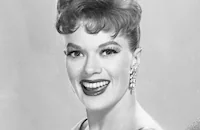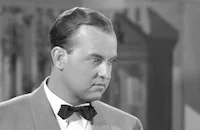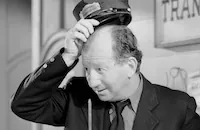Love and Learn

Brief Synopsis
Cast & Crew
Frederick De Cordova
Jack Carson
Martha Vickers
Robert Hutton
Janis Paige
Otto Kruger
Film Details
Technical Specs

Synopsis
Struggling songwriters Jingles Collins and Bob Grant are unable to sell a song without an endorsement from a well-known band. After a failed attempt to demonstrate their talents to theatrical producer Hugo Bronson, Bob decides to return home to the small town where his mother lives. Jingles and his longtime girl friend Jackie then take Bob out on the town to celebrate his last night in New York City. Meanwhile, wealthy Barbara Wyngate, tired of having her life planned by her socially prominent mother, resolves to have one last fling before she marries her stodgy fiancé Willard. While her family attends the opera, Barbara goes slumming at Danceland. Because unescorted women are not allowed at the club, Barbara pretends to be a dance hostess. By chance, Bob, Jingles and Jackie are also at Danceland. Mistaking Barbara for the girl friend of the club's band leader, Linky, Jingles encourages Bob to try to persuade her to ask Linky to play one of their songs. Without revealing her real identity, Barbara explains that she has no influence with Linky, but she is attracted to Bob and later leaves the club with the others. Having fallen in love with Barbara, Bob decides to stay in New York and invites her to lunch the following day. In order to keep her identity a secret, Barbara rents a modest apartment, where she pretends to live. Later, Barbara throws a party for Jingle's birthday and asks her father to pick out a gift for him. Wyngate buys a cigarette case from Tiffany's, a gift that is far too extravagant to have been purchased by a supposedly unemployed woman. Bob's suspicions grow when Barbara gives Jingles and him a diamond bracelet to pawn so that they can use the money to publish their songs themselves. When Bob sees a newspaper report about a beautiful girl burglar, he immediately assumes that Barbara is a kleptomaniac, but after the police arrest the burglar, he is forced to find another explanation for Barbara's mysterious source of income. Barbara promises to explain everything that evening at dinner. Then she secretly asks her father for a check, which she uses to persuade music publisher Wells to publish one of Bob and Jingle's songs. Bob is so excited when Wells signs them that he rushes to Barbara's apartment to tell her the news. After Barbara's landlady tells Bob that Barbara never sleeps in her apartment, Bob sees Wyngate drop Barbara off at the apartment and mistakenly believes that she is a kept woman. Disillusioned, Bob returns to his mother's house and refuses to listen to Barbara's explanation. Even when their song becomes a big hit, Bob refuses to return to New York or to write more songs. Desperate to get his partner back to work, Jingles agrees to marry Jackie and asks Bob to be his best man. Bob takes part in the wedding but insists that he will leave town immediately afterward. When he learns that Barbara paid for publishing the song, however, Bob decides to confront her. In the meantime, Barbara has eloped with Willard. Wyngate, who dislikes Willard, clears up the misunderstanding between Bob and Barbara, and Bob and he rush off to stop the marriage. They arrive in the nick of time, and Bob and Barbara are married.

Director

Frederick De Cordova
Cast

Jack Carson

Martha Vickers

Robert Hutton

Janis Paige

Otto Kruger
Barbara Brown

Tom D'andrea

Florence Bates

Craig Stevens

Angela Greene

Don Mcguire

John Alvin

Herbert Anderson
Jane Harper
Lou Nova
Jack Kenney

Grady Sutton
Charles Marsh
Grayce Hampton
George Meader
Philo Mccullough
Creighton Hale
George Lloyd

Hank Mann

Iris Adrian
Colin Campbell
Jimmy Ames
Tom Wells
Oliver Blake
Sarah Padden
Edward Clark
Ross Ford
George Campeau
Trudy Irwin
Almira Sessions

Byron Foulger
Crew
Wesley Anderson
Harry Barndollar
Everett A. Brown
Eugene Conrad
Murray Cutter
Elmer Decker
I. A. L. Diamond
Edwin B. Dupar
Stanley Fleischer
Ray Heindorf
Ray Heindorf
William Jacobs
Felix Jacoves
M. K. Jerome
James Leicester
Frank Magee
Harry Sauber
Jack Scholl
Max Steiner
Francis Swann
Walter Telford
Charlie Tobias
Travilla
Jack L. Warner
Perc Westmore

Film Details
Technical Specs

Articles
Love and Learn
By Frank Miller

Love and Learn
Quotes
Trivia
Notes
Editor Frank Magee's name was misspelled as "McGee" in the onscreen credits. A August 5, 1946 Hollywood Reporter news item notes that Eleanor Parker refused an assignment in this picture, stating that the script was not suitable, and was placed on suspension. One week later, Martha Vickers was cast in her place. Harry Sauber's original screen story was also the basis for the 1934 Warner Bros.' film Happiness Ahead, directed by Mervyn LeRoy and starring Dick Powell and Josephine Hutchinson (see AFI Catalog of Feature Films 1931-40; F3.1775).















